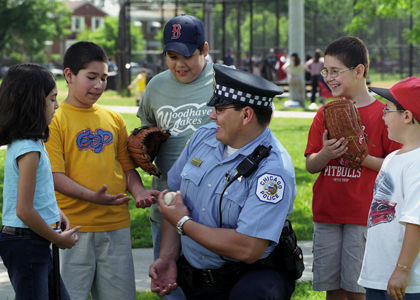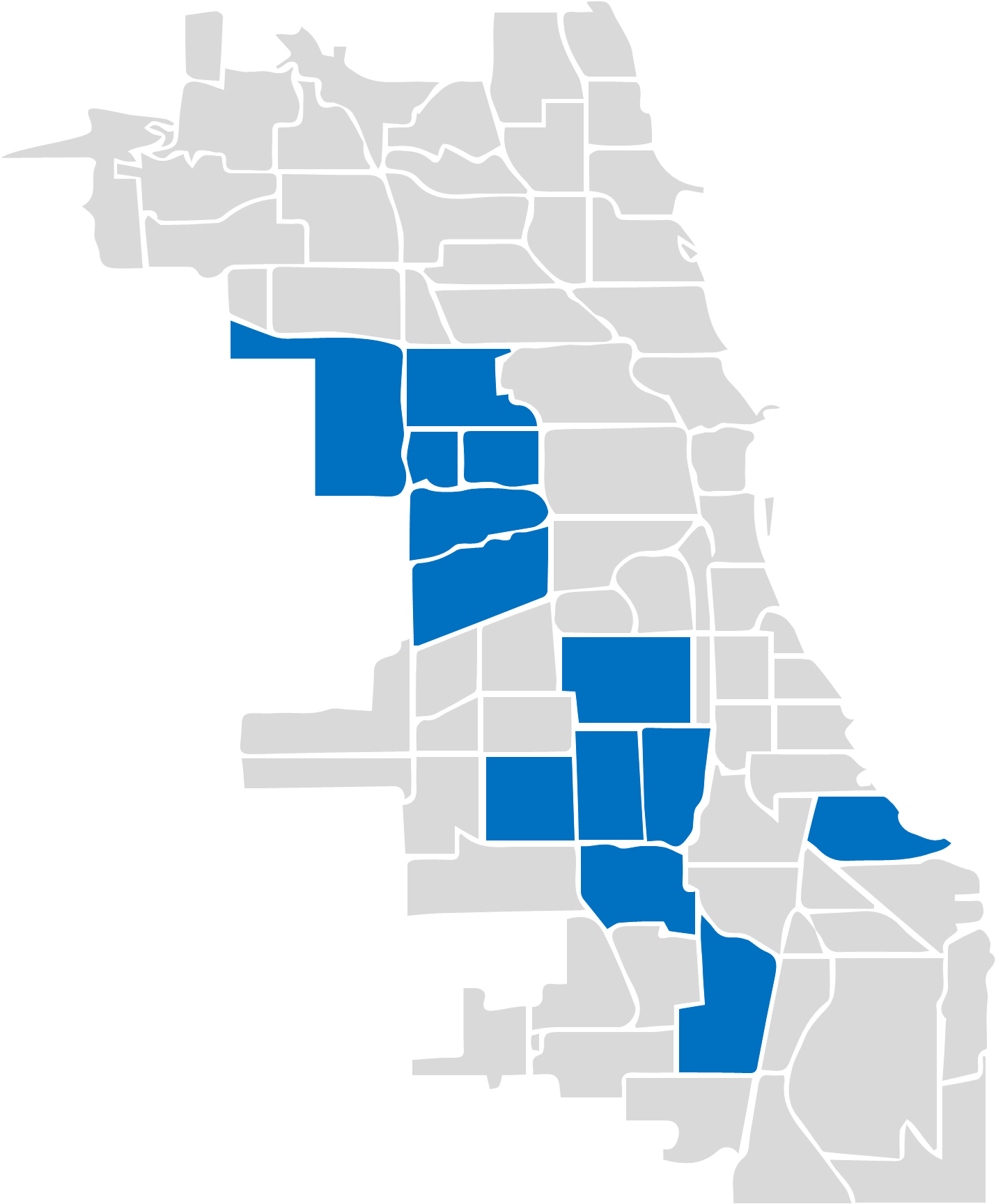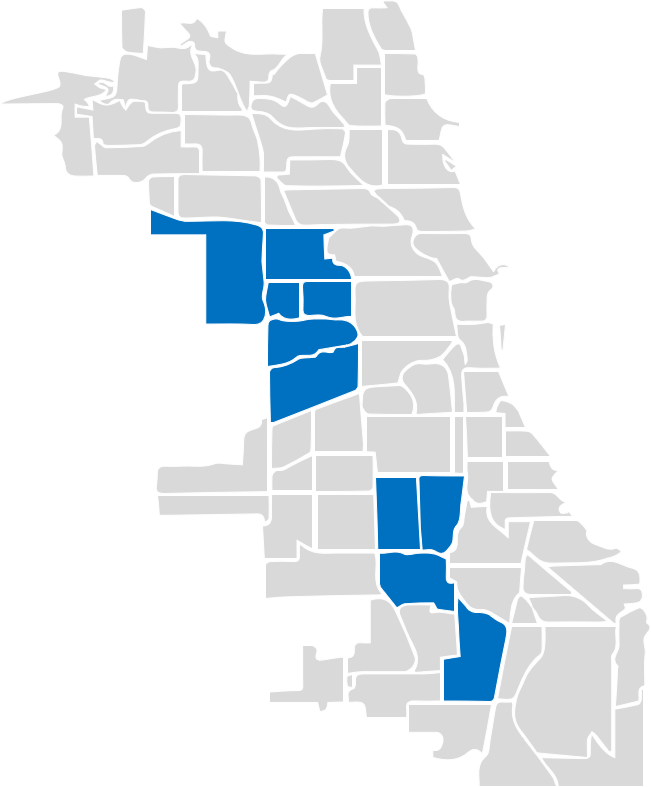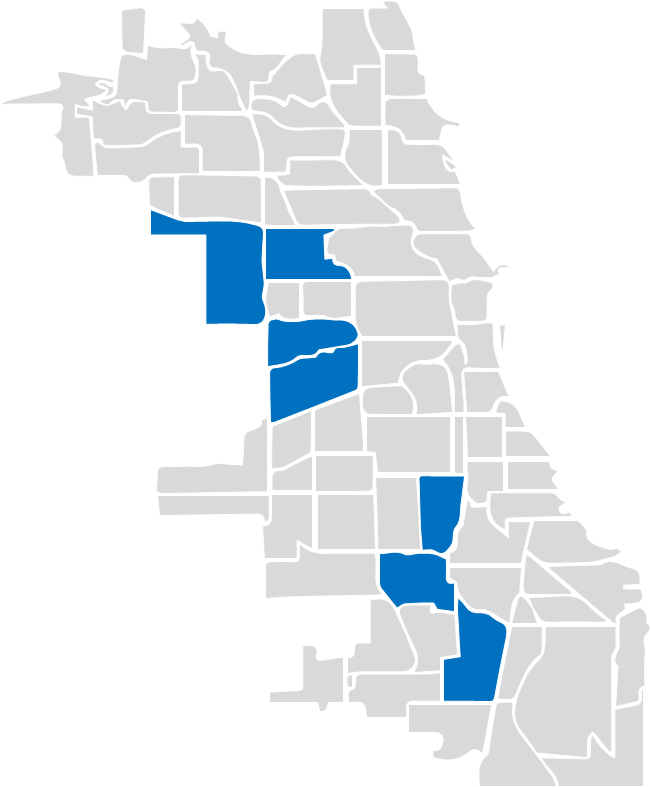Violence Reduction Strategies

The Mayor's Office for Community Safety focuses on community-based investments to reduce violence and promote safety and wellbeing. In many cases, these engagement-focused services are more impactful as complements to traditional law enforcement activities rather than relying on law enforcement, alone. Tandem improvements in community perceptions of police, reductions in crime, and an improved sense of community safety and belonging can be achieved when collaboration among residents, businesses, and other local stakeholders engage in proactive strategies that prevent crime and support healthy and safe communities.
Learn more about our key initiatives below.




Street outreach
The Mayor's Office of Violence Reduction prioritizes street outreach and violence interruption services which are often considered secondary prevention or “in the thick” strategies to reach people who may be at increased risk for involvement in violence. In many cases, these engagement-focused services are more impactful as complements to traditional law enforcement activities rather than relying on law enforcement, alone. Conflict interruption programs reduce violence, injury, and lethality by employing street outreach workers to detect, interrupt and de-escalate potentially violent incidents in highly impacted neighborhoods and change the thinking and behaviors of persons at the highest risk of violent involvement.
We define “Street Outreach” as: actively working in “the streets” to engage individuals who are at immediate and high risk of being either victims or perpetrators of violence. Street Outreach staff engage with these individuals in a variety of settings, including parks, homes, street corners, community centers, schools, hospitals or any place these individuals frequent. Street Outreach staff are focused on building relationships with persons at high-risk so that they can promote peace by mediating potential and existing conflicts. The staff also serve as connectors to services and as a support to both the individuals and their families. Street Outreach efforts are typically conducted in the afternoons/evenings and late at night when violence is most prevalent. Some key street outreach activities include:
-
Engage and support individuals and groups at high risk of violence
-
Reclaim public spaces for safe activities for the entire community
-
Respond to critical incidents such as shootings and homicides to de-escalate tension and rumor control
-
Support victims and their families
-
Conduct proactive peace-building activities
-
Mediate and resolve conflicts between street groups
-
Make referrals for services and support
Community areas with street outreach partners

Community area |
Street outreach partner |
Auburn Gresham |
TARGET AREA DEVELOPMENT CORPORATION |
Austin |
INSTITUTE FOR NONVIOLENCE CHICAGO |
Chicago Lawn |
SOUTHWEST ORGANIZING PROJECT |
East Garfield Park |
BREAKTHROUGH URBAN MINISTRIES |
Englewood |
TARGET AREA DEVELOPMENT CORPORATION |
greater grand crossing |
ACCLIVUS, INC. |
Humboldt Park |
ALSO |
New City |
PRECIOUS BLOOD MINISTRY OF RECONCILIATION |
North Lawndale |
UCAN |
Roseland |
UCAN |
South Lawndale |
NEW LIFE CENTERS |
South Shore |
CLARETIAN ASSOCIATES |
West Englewood |
TARGET AREA DEVELOPMENT CORPORATION |
West Garfield Park |
INSTITUTE FOR NONVIOLENCE CHICAGO |
West pullman |
ACCLIVUS, INC. |
Victim Services
Victim services organizations provide comprehensive trauma-informed services for victims of violence and their families and other loved ones, including incident response and supporting impacted individuals through one-on-one interactions, support groups, and resource coordination.
Individuals and families across Chicago are impacted by community violence every day. Both victims and those who are close to victims, such as family members, friends, and partners, experience trauma, which is defined by the Substance Abuse and Mental Health Administration (SAMHSA) as:
Individual trauma results from an event, series of events, or set of circumstances experienced by an individual as physically or emotionally harmful or life-threatening with lasting adverse effects on the individual’s functioning and mental, physical, social, emotional, or spiritual well-being.
We also know that violence impacts entire communities, not just those who have been directly injured. Exposure to community violence for children and adults leads to adverse psychosocial and health outcomes, which emphasizes the need for the City to support affected victims and communities. Our network of victim services providers seeks to ensure that all victims of violence receive the supports they need in order to heal.
Community areas with victim services partners

Community area |
Victim services partner |
Auburn Gresham |
UNIVERSAL FAMILY CONNECTION |
Austin |
INSTITUTE FOR NONVIOLENCE CHICAGO |
East Garfield Park |
BREAKTHROUGH URBAN MINISTRIES |
Englewood |
UNIVERSAL FAMILY CONNECTION |
Humboldt Park |
BUILD |
New city |
INSTITUTE FOR NONVIOLENCE CHICAGO |
North Lawndale |
UCAN |
Roseland |
UCAN |
South Lawndale |
NEW LIFE CENTERS |
West Englewood |
CENTER FOR NEW HORIZONS |
West Garfield Park |
INSTITUTE FOR NONVIOLENCE CHICAGO |
Capacity building and small grants
Smaller, neighborhood-based organizations are often well positioned to provide crime and violence prevention activities in their communities. These groups know the community members and leaders, understand community needs, and have ideas for how to address violence. The Mayors Office of Violence Reduction seeks to support these organizations in their efforts through small grants and capacity building opportunities, which will ultimately strengthen local efforts and promote safety and peace in communities.
Let's Link Chi
Let's Link Chi, a partnership between the Office of Violence Reduction and the Chicago Community Trust and Chicago’s philanthropy community, is a small grants fund designed to engage communities in cultivating safe, accessible places where neighbors can assume ownership and promote positive activities. It is intended to enhance longer-term and larger efforts to address the problem of gun violence. Let’s Link Chi is a key component of the Mayor’s Office focus on supporting the people and communities most impacted by violence. Other components include street outreach, victim services, support for high-risk youth, and trauma-informed training.
The three pillars of the Let’s Link Chi are:
- Activating public spaces changes individual and collective perceptions leading to new social norms.
- Activities that promote physical exercise, mindfulness and social-emotional skills increase resiliency.
- Consistency in activating spaces over time makes them safe, accessible and places where neighbors can assume ownership.
Let’s Link Chi offers rapid-response grant opportunities designed to support activities by nonprofit organizations that subscribe to these pillars, promoting cohesion, safety and peace in neighborhoods. It is a direct response to the many people and grassroots organizations that are taking on-the-ground action in their neighborhoods.
Community areas with Let's Link Chi partners
Community Area |
Organization |
Auburn Gresham |
Metro Vision Partners NFP |
The Black Star Project |
|
Austin |
Austin Town Hall Park Art & Culture Committee |
GAP community Center |
|
Jehovah Jireh 1 Outreach Ministry |
|
The Garden of Love |
|
Mothers On a Mission 28 |
|
East Garfield Park |
City of Refuge - Chicago |
Reborn Ministries |
|
Englewood |
New Eclipse Community Alliance |
Something Good in Englewood Inc |
|
Goodkids Madcity Englewood |
|
Greater Grand Crossing |
Kindness Campaign |
Sacred Ground Ministries |
|
Humboldt Park |
Kells Park Community Council |
Opera Matic NFP |
|
New City |
CBR Tranquility Development NFP |
Union Impact Center |
|
North Lawndale |
360 Nation |
Project Impact 180 |
|
Roseland |
Kids Off the Block Inc |
Rock Enterprises and Development Corporation |
|
South Chicago |
Bush Community Gardeners Organization |
Free Lunch Academy |
|
South Lawndale |
Party Per Purpose |
OPEN Center for the Arts |
|
South Shore |
Sisters in Cinema |
South Merrill Community Garden |
|
South Side Jazz Coalition |
|
Sacred Ground Ministries |
|
Washington Park |
Future Ties NFP |
West Garfield Park |
Mothers Ona Mission28 |
City of Refuge - Chicago |
|
Reborn Ministries |
|
West Pullman |
FOUS Youth Development Services |
SCaN (Service Coordination and Navigation)
The Service Coordination and Navigation program model is DFSS's new pilot program that seeks to stabilize eligible youth in their environment, increase their self-efficacy (confidence in the ability to exert control over one’s own motivation, behavior, and social environment), and assist in their transition to adulthood. Youth are paired with a full-time “Navigator” who provides coordinated care interventions utilizing a strong community-based network of services. The program model aims to reduce youth involvement in violence and contribute to a reduction in violence at the community-level. The target population is youth ages 14-24 years old at the highest risk of violence involvement.
Community areas with SCaN partners

COMMUNITY AREA |
SCaN partner |
auburn gresham |
ST. SABINA |
AUSTIN |
BUILD, INCCATHOLIC CHARITIESHealing Hurt People Chicago |
englewood |
PRECIOUS BLOOD MINISTRY OF RECONCILIATIONCHILDREN'S HOME & AIDYOUTH ADVOCATE PROGRAMS |
HUMBOLDT PARK |
BUILD, INCPUERTO RICAN CULTURAL CENTERALTERNATIVE SCHOOLS NETWORK |
NORTH LAWNDALE |
LAWNDALE CHRISTIAN LEGAL CENTER |
ROSELAND |
SGA YOUTH & FAMILY SERVICESMETROPOLITAN FAMILY SERVICESPHALANX FAMILY SERVICES |
Neighborhood Activation
Neighborhood Activation is a focused violence prevention and community investment initiative that combines community aspirations with City investments and assets to implement programs, social services, and changes to the built environment at a hyper-local block level.
The first pilot of Neighborhood Activation is focused on a few key blocks in West Garfield Park. The Mayor's Office partnered with the Garfield Park Rite to Wellness Collaborative, Studio Gang, the Goldin Institute, and community residents to understand community needs and envision solutions. Resulting projects included tree planting, youth summer jobs and programming, beautification of vacant lots, monthly produce markets at Legler Library in partnership with the Greater Chicago Food Depository, improvements to the public way to promote pedestrian safety, mural and art projects, community-designed street banners, and more, with additional investments to come!
One key project was the development of a Community Plaza and Roller Rink at 4008 W. Madison Street. The Community Plaza is a safe outdoor space in the neighborhood for residents to gather and build community.
Partners included:
- Garfield Park Rite to Wellness Collaborative
- Studio Gang
- Goldin Institute
- Site Design Group
- Chicago Park District
- Chicago Public Libraries
- Chicago Department of Transportation
- Chicago Department of Public Health
- Chicago Department of Family & Support Services
Press:
